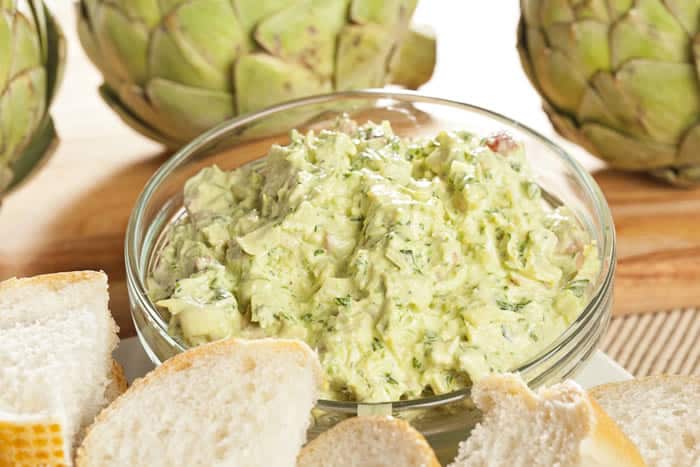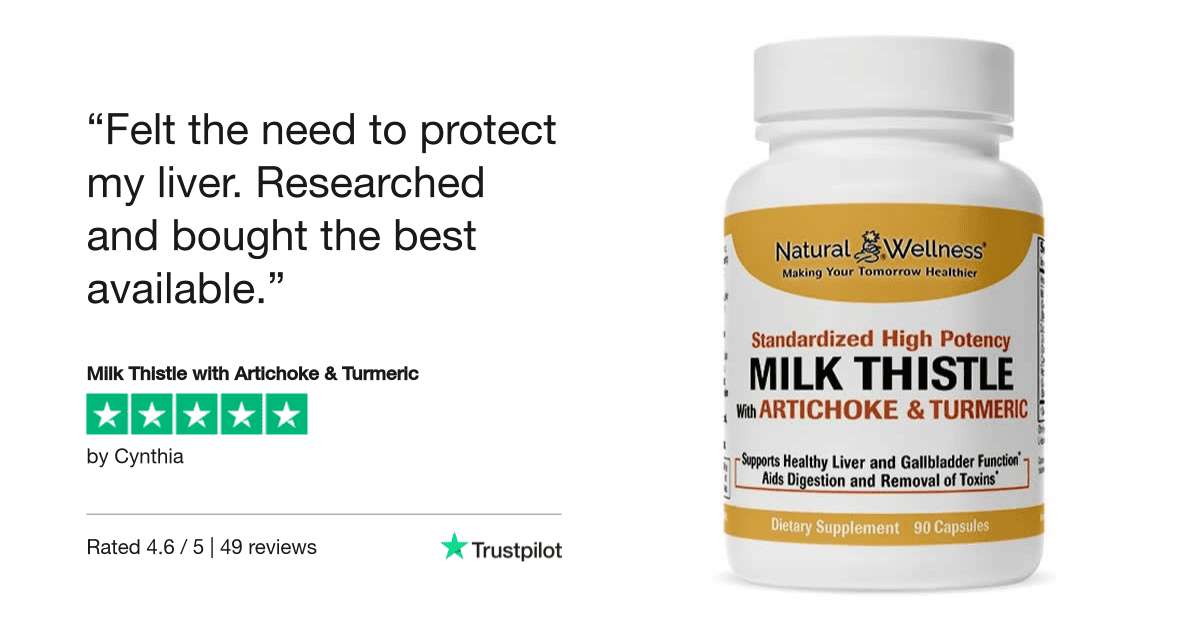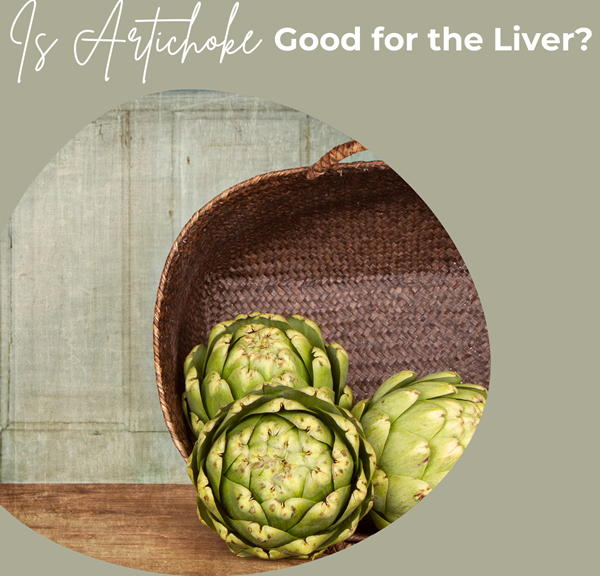
Previous
Are Massages Good for the Liver?

Next
Signs Your Liver Detox Is Working
Is Artichoke Good for Your Liver?
Discover research that supports why artichoke is good for your liver, as well as multiple ways you can get more artichoke in your diet.
Vegetables are an important part of a healthy diet. But one vegetable often overlooked for its health benefits is the artichoke, with one of those benefits being improved liver health.
Research Supports Artichoke Is Good for Your Liver
One reason artichoke is good for the liver is through its effects on two enzymes: alanine aminotransferase (ALT) and aspartate aminotransferase (AST). High ALT and AST levels are associated with liver damage or injury.
A 2022 review published in the Journal of Medicinal Food reported that subjects consuming artichoke leaf extract had a significant reduction in levels of these liver enzymes. (1) Their total cholesterol, low-density lipoprotein, and triglyceride levels were significantly reduced as well. This second finding is important because high cholesterol often co-occurs with fatty liver disease. (2)
Other research adds that artichoke also promotes liver health by suppressing the inflammation and death of liver cells that commonly occurs with non-alcoholic fatty liver disease (NAFLD). (3) Now renamed metabolic dysfunction-associated steatotic liver disease (MASLD), this condition is characterized by a buildup of fat in the liver, negatively impacting its ability to function.
Other Artichoke Health Benefits
In addition to being good for the liver, artichoke has other health benefits. They include: (4)
• Protecting against heart disease
• Playing a role in cancer prevention and treatment
• Aiding in the treatment of digestive disorders, especially indigestion
• Reducing fasting blood sugar, which is important for people with diabetes
• Supporting weight loss
• Being a good source of vitamin C, folate, and magnesium (5)
How to Get More Artichoke in Your Diet
Artichoke can taste bitter when consumed raw but has an earthy, nutty flavor when cooked. People generally trim the tougher outer leaves and only eat the inside or “heart” of this vegetable. Although, the base of the exterior leaves is also edible.
You can eat artichoke as a side dish by boiling it or roasting it in the oven. Grilled artichoke is also tasty. Season it with garlic, oregano and thyme, or lemon juice for additional flavor.
If you’re looking for a nutrient-packed pre-meal snack, spinach artichoke dip makes for a great appetizer.

Many use canned artichokes for this purpose. This creamy dip can be served warm or cold, making it a satisfying treat during both the summer and winter months.
Another Option: Take a Supplement Containing Artichoke Extract
If you don’t like the taste of artichoke or simply want more in your diet, another alternative is to take a supplement that contains artichoke leaf extract. This enables you to enjoy this vegetable’s many health benefits without worrying about how to fit it into your diet more frequently.
How much artichoke extract should you take for liver health? The U.S. Food and Drug Administration (FDA) does not provide a recommended intake, as it does for many other healthy nutrients. That said, doses ranging from 50 to 2,700 milligrams per day are common in studies, with results suggesting that consuming more than 500 milligrams daily may provide greater effects in terms of liver health. (6)
What about artichoke supplement side effects? According to one review, neither human nor animal studies have reported any adverse effects of artichoke supplementation regardless of dose. (7)
Which Is Better for the Liver: Milk Thistle or Artichoke?
Milk thistle is another natural ingredient known to promote liver health by both protecting it from disease and helping to treat liver disorders. (8) So, you may be wondering which is better for liver health. The answer is both.
A milk thistle supplement can help support optimal liver function, as can an artichoke leaf supplement. But add them together and you gain the effects of each. This means that the best artichoke extract for the liver is one that contains milk thistle too.
If you’re interested in this approach, Natural Wellness offers a Milk Thistle with Artichoke and Turmeric supplement designed to support healthy liver function.

Taking a combination supplement such as this makes it easier to get both ingredients into your diet. This product is manufactured in the U.S. and lab verified for quality, dosage, and potency.
(1) Mohamed Kamel, A., Ali Farag, M. (2022, October 13). Therapeutic Potential of Artichoke in the Treatment of Fatty Liver: A Systematic Review and Meta-Analysis. Journal of Medicinal Food. doi:10.1089.jmf.2022.0025
(2) Cedars Sinai. (n.d.). Nonalcoholic Fatty Liver Disease. Retrieved August 22, 2024, from https://www.cedars-sinai.org/health-library/diseases-and-conditions/n/nonalcoholic-fatty-liver-disease.html
(3) Lee, M., Kim, D., Park, S.J., et al. (2021, October 15). Artichoke Extract Directly Suppresses Inflammation and Apoptosis in Hepatocytes During the Development of Non-Alcoholic Fatty Liver Disease. Journal of Medicinal Food. doi:10.1089/jmf.2021.K.0069
(4) Al Amrani, H.A., khalaf Aneed, I. (2023, July 16). Artichoke and Health (Food and Medicine): A Review. Journal of Genetic and Environmental Resources Conservation. Retrieved August 22, 2024, from https://www.iasj.net/iasj/download/1543de02831054ff
(5) California Artichoke Advisory Board. (n.d.). Health and Nutrition. Retrieved August 22, 2024, from http://artichokes.org/recipes-and-such/health-and-nutrition
(6) Reza Amini, M., Sheikhhossein, F., Talebyan, A., et al. (2022, July). Effects of Artichoke Supplementation on Liver Enzymes: A Systematic Review and Meta-Analysis of Randomized Controlled Trials. Clinical Nutrition Research. doi:10.7762.cnr.2022.11.3.228
(7) Reza Amini, M., Sheikhhossein, F., Alvani, M., et al. (2022, July). Anti-Hypertensive Effects of Artichoke Supplementation in Adults: A Systematic Review and Dose-Response Meta-Analysis of Randomized Controlled Trials. Clinical Nutrition Research. doi:10.7763.cnr.2022.11.3.214
(8) Olajide, P.A., Adetuyi, B.O., Oloke, J., Omalabi, F.K. (2022, June). Pharmacological, Biochemical and Therapeutic Potential of Milk Thistle (Silymarin): A Review. World News of Natural Sciences. Retrieved August 22, 2024, from https://www.researchgate.net/publication/361407793_Pharmacological_Biochemical_and_Therapeutic_Potential_of_Milk_Thistle_Silymarin_A_Review






